The Monday Morning Run: US upsets Jamaica, Sanya Richards-Ross shines, Kenya falters
Kevin Sully | On 04, May 2015
The World Relays churn out headlines. World records. Upsets. Americans crashing out in a relay. Americans celebrating a victory in a fashion that will in no way come back to haunt them later on in the summer.
As expected, the event itself was an entertaining two days. Like last year, the team element created an urgency that is missing for 95% of the track season. In the traditional relays (4 x 100 and 4 x 400), there were Olympic berths at stake. For the other events, there was a sense of importance because the races are contested so infrequently at the professional level. What are the chances we see another high level 4 x 200 until the World Relays resume in 2017?
It’s not likely.
It was fun to see that immediacy play out on the track in front of an engaged and energized crowd. It’s also always cool to see people run around with flags after a race. I wish they weren’t waiting until 2017 to run this meet again. But alas they are, so this will be the last World Relays recap for two years. I’m already missing the malfunctioning starting gun and the startlingly athletic mascot.
There was plenty for the United States to get excited about. They won seven of the 10 events, taking home the coveted golden baton for the team championship. Here are some of the highs and lows from the weekend.
The Medalists
The top three performances of the week…..
Gold: Sanya Richards-Ross
In a meet designed to showcase teams, her two gold medals stood out. On Sunday, she ran the fastest split in the women’s 4 x 400, 48.79, and removed any doubt that the US would lose the race. By the time she handed the baton to Francena McCorory, the only question was the time. McCorory ran 49.27 and finished in 3:19.39. That’s extremely fast for early May, especially when you have Allyson Felix on your bench, who has already split a 49.5 this year. It almost makes me think that the world record of 3:15.17 just might be vulnerable in Beijing at the World Championships. The American quartet was sharp for Sunday’s race and the crowd and the competition provided a good stage for a fast time. Maybe dropping four second between now and August will be tougher than expected.
Back to Richards-Ross. A day earlier, she again put to bed a race with her 400 leg. Running second in the distance medley relay, she received the baton from Treniere Moser a bit behind Kenya’s first runner. At this point, you felt horrible for Kenya’s 400 runner because you knew the last thing she wanted was to get the baton just ahead of Richards-Ross. Behind, hey that lowers the expectations. Big lead, maybe I can hold on to that! But just ahead allowed her to be swallowed alive by the end of the first turn.
Richards-Ross turned the deficit into an almost three second lead and essentially ended the race. Who says the 400 doesn’t really matter in the DMR?
Well, with Ajee Wilson and Shannon Rowbury, Richards-Ross could have run a 52.12 instead of the 50.12 and the US still would have won, but it did put the race out of reach so no other runners could think of clinging on to Wilson during her 800 leg.
Silver: US women’s mid-distance
The squad with Richards-Ross, Moser, Wilson and Rowbury finished in 10:36.50 and broke the world record. That race, and the 4 x 800, basically served as time trials for the US to show off the enormous depth of US women’s mid-distance running. They could have run a second team of Brenda Martinez, Francena McCorory, Chanelle Price/Alysia Montano and Jenny Simpson and also broken the world record.
Their dominance was even bigger in the 4 x 800 on Sunday. Price, Molly Beckwith-Ludlow, Maggie Vessey and Alysia Montano went all Pre vs. George Young and negative split the competition– 2:01.30 for Price, 2:00.92 for Vessey, 1:59.50 for Ludlow and 1:58.90 for Montano. Their overall time of 8:00.62 was a national record. Even if Kenya sent a legitimate team (more on that below), they weren’t matching the US depth. Like the distance medley, they could have spit out a different combination of four runners who could have run right at eight minutes.
Montano’s leg was the most interesting. With victory basically assured, she ran her first 400 in 54 seconds. She came back in about 64 seconds for the final lap and still won by a ridiculous margin. After last week at Drake relays I was worried we’d see the last of insane first lap Montano. Rest assured, she’s back.
Bronze: Veronica-Campbell-Brown/Javon Francis
It was hard to find individual honors in a team competition, so I’ll choose two performances from Jamaicans that came from opposite ends of the age spectrum.
Francis tied for the fastest split in the 4 x 400 with a 44.00 anchor leg. They finished fourth despite his big run and can be a serious medal contender if they can find three other runners to put around him. From a pure spectating standpoint, it’s fun to watch him on a less than superb team. If he was on a team like the US, his crazy splits would blend in. Instead, he always gives you something to watch in that second pack of runners. He’s only 20-years-old so we should hear much more from him in the individual 400 this season and next.
Campbell-Brown also found herself in the chase position during the women’s 4 x 100. She got the baton dead even with the United States and tore past Carmelita Jeter on the homestretch to defeat the Americans 42.14 to 42.32. That was the only loss for the US that didn’t involved a bad exchange. Campbell-Brown’s split was 10.00 and she looks like she is closer to her pre-suspension/not suspension form. The depth on the men’s side might be a tad suspect for Jamaica, but the women look strong as ever with contributions from veterans and newcomers.
Surging….
-The Slash Heard ‘Round the (Track) World
If you expected Ryan Bailey to act like he’s been there before, well, he hasn’t. Nobody has against Usain Bolt since 2007. Tyson Gay and Justin Gatlin have each beaten him in races, but those races didn’t have the energy and expectations of this weekend. The reality is Bailey, and the rest of the American sprinters, have spent most of the last eight years playing the Washington Generals to Bolt’s Harlem Globetrotters. Given the chance to throw it back in Bolt’s face, Bailey took advantage.
Ryan Bailey turns Usain Bolt’s “To Di World” pose into a throat-slashing gesture after US beats Jamaica in 4x100m. pic.twitter.com/BYAeHgHqpW
— Nick Zaccardi (@nzaccardi) May 3, 2015
The only thing stranger than watching Bolt come across the line in second place is Bolt being taunted after he loses. There are plenty of practical reasons why the gesture was silly–it’s a race in May, it was not an individual event and Bolt just handled Bailey easily last month in an open 100.
Still, it was fun and goofy and added some life into the event. It would have meant more if the two got the baton at the same time. Bolt closed the gap on Bailey and apparently ran the fastest anchor leg of all-time. None of that was known at the time, however, and the stat of the night was the US snapping Jamaica’s eight year win streak in global championships. It also set a high bar for the second night of the meet, with the possibility of the two meeting again in the 4 x 200.
Bolt and his team had already voiced their displeasure with Tyson Gay and Justin Gatlin so adding Bailey to the mix seemed like the next logical chapter in Bolt v. US. The next 24 hours took an odd turn with Bailey and Jamaican sprinter Warren Weir sending increasingly aggressive tweets about Bailey’s throat slash, Bailey and Bolt allegedly being cool with one another, Bolt withdrawing from the 4 x 200, and the Jamaican 4 x 200 team doing the “To Di World” pose on the medal stand after their win while Bolt sat in the stands and played with his iPhone.
That last sentence is why the World Relays should be twice a year.
-American men’s middle distance
Without a serious challenge from Kenya, the US was able to win both mid-distance relays. The 4 x 800 was a tighter version of the women’s 4 x 800 with a close race early followed by the US depth ultimately proving decisive. The men’s distance medley was probably the most eventful relay of the meet. The lead changed hands several times and the United States and Kenya were dead even at the last exchange. Then, American Ben Blankenship told Kenya’s Timothy Cheruiyot to take the lead, he even pointed to him where to go, and for some reason Cheruiyot followed the instructions. I’m sure Blankenship did that because he wanted to draft, but Cheruiyot’s sub 52 second first 400 made following unwise.
Cheruiyot came undone on the last lap and Blankenship finished off a 3:51 anchor leg with a great finish. The US team of Kyle Merber, Brycen Spratling, Brandon Johnson and Blankenship combined for a time of 9:15.50, which is, you guessed it, a world record.
-Relay teams we didn’t know existed
Botswanan men’s 4 x 400 team and Papua New Guinea’s men’s distance medley relay, we salute you!
-Jeremy Wariner
He split a 44.80 in the final of the men’s 4 x 400, just .08 slower than Lashawn Merritt’s. Who saw that coming? He also ran a very smart leg and capitalized after Steven Gardiner of The Bahamas made a big move to run past him. Warnier didn’t get carried away and waited for Gardiner to fall apart. With Gardiner moving backwards, Wariner regained the lead on the homestretch and had the US in front at the final exchange, giving Lashawn Merritt a drama free anchor leg.
-National Records
As can be expected, there were records aplenty in at The World Relays. Some carried more value than others depending on the particular race and the history of each particular nation. The Borlee trifecta carried Belgium to a national record in the 4 x 400, running 2:59.33 and finishing third behind the United States and The Bahamas.
The Canadian women ran 42.94 in the prelims of the 4 x 100 and 42.85, both national records according to their federation. Canada did run 42.77 at the 1984 Olympics, but their federation does not recognize that mark because of connections to doping.
-Asafa Powell
Powell ran 10.08 into a headwind in Guadelope. Jamaica could have used him in the 4 x 100 on Saturday.
-Aleec Harris/Sharika Nelvis
Also in Guadelope, Harris continued his undefeated 2015. He ran 13.18 and easily beat Wilhem Belocian. Another victory and another win over a quality opponent for Harris. The women’s race was much tighter with Nelvis edging Brianna Rollins, 12.77 to 12.84. Last week at the Drake Relays, it was Jasmine Stowers who broke into the top tier of high hurdlers with a big upset and a fast time.
These two, Nelvis and Stowers, are the main candidates to disturb the American form charts and run their way to Beijing. Rollins, Queen Harrison, Dawn Harper Nelson all looked like locks to begin the year, but this younger tandem is already closing quickly.
-Sally Kipyego
Stateside, Kipyego reminded us that Kenya distance runners are really fast, winning the 5,000 at the Payton Jordan Invitational in 14:57. In a surprise, Nicole Tully finished third with a time of 15:05 in her first 5,000 on the track.
Slowing….
-4 x 200 handoffs
It might be time to go to open handoffs in the 4 x 200. At least for the United States. They had two chances at gold medals go down in flames in the exchange zone. The women’s team was cruising to victory with one pass remaining. Jeneba Tarmoh tried to get the baton to Allyson Felix and both ended up on the ground. The two were completely out of sync and once the initial pass whiffed, the errors compounded until they collided. A safe pass, any pass really, would have meant an easy victory. Instead, it was Nigeria taking the gold medal and the US failing to finish.
The men’s 4 x 200 was shaping up to feature Justin Gatlin vs. Warren Weir on the anchor leg. It wasn’t Bolt vs. Gatlin, but hey it was still pretty good. That potential match-up evaporated on the second exchange when the United States seemingly did everything possible not to pass the baton. Jamaica didn’t do much better. Their incoming runner actually ran past their outgoing runner, but they stayed in the lanes and got the baton away in the zone. The Americans kept running and with no real chance at victory Gatlin moved the United States up from seventh to third. It had about the same effect as someone chasing a bus–cool to watch, but the outcome was already decided.
Soon after the race, the US was disqualified for that second exchange. Jamaica won the uncontested gold with France second and Germany third.
-Kenyan distance runners at the World Relays
It turns out you can’t throw any runner in a Kenyan jersey and expect a win. We knew Kenya wasn’t bringing their best team, but this group may not have even been their tenth best. In the four distance relays, they were well-beaten. In the women’s 4 x 800 they finished last, behind Mexico, Canada and Jamaica.
They were somewhat close in the men’s DMR, but their anchor ran such a tactically bizarre 1,600 that you wondered if he knew the race was four laps. And then there was the men’s 4 x800. They were well beaten by the US and ended up getting disqualified when one of their runners grabbed the baton too soon. Exchange zones are non-negotiable, even if your incoming runner is hemorrhaging time.
I’m sure Americans enjoyed the wins and the records. Somewhere in the back of their mind though, they might be wishing they did it against Asbel Kiprop, Eunice Sum and the rest of the Kenyan “A” squad. I know the fans feel that way.
-Pros at Payton Jordan
The men’s 5,000 and 10,000 were slow in comparison to prior years. The headliners didn’t perform very well either, Lopez Lomong was 9th in the 5,000 and Nick Symmonds 10th in the 1,500. On the brightside, plenty of runners have run fast at Payton Jordan and never improved throughout the season. Say it with me now, it’s….still….early….
-Former/current prep phenoms
Alexa Efraimson is still in high school, but running professionally. Mary Cain is one year out of high school and is continuing to run with the Oregon Project. Cranny is running for Stanford. Those three, along with Sara Baxter, made up the core of a group of high school runners that were so good at such a young age. Regardless of what they do as pros, their high school careers will hold up long into the future.
Over the weekend, they didn’t have their best string of races. Cranny was 10th in the 1,500 at Payton Jordan running 4:16.22. Efraimson ran 16:09 and finished 19th in the second section of the 5,000. In Corvallis, Cain ran 4:15.42 in the 1,500.
Cain won, which is a good sign after her struggles in her last few races. None of these results spell doom. Rather, they are reminders that running success isn’t always a linear progression.


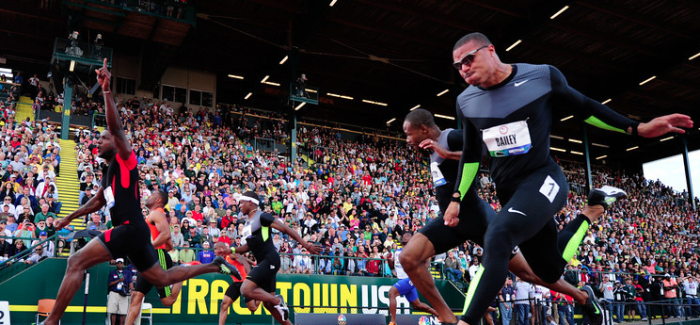
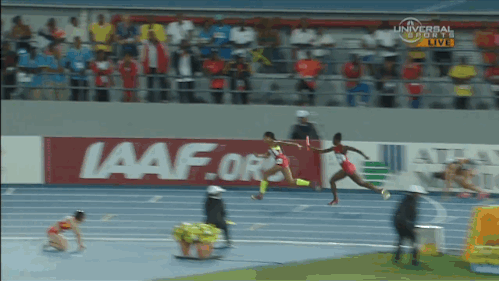
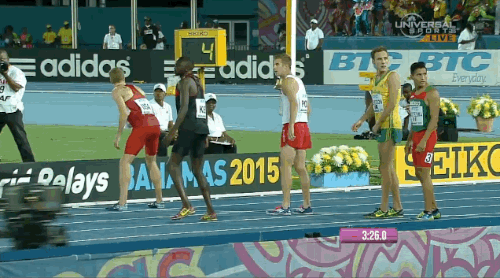
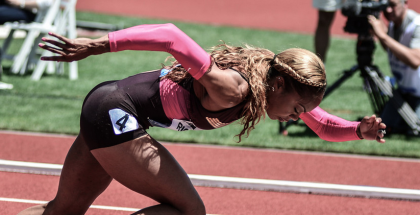
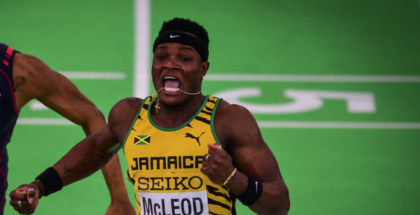














Submit a Comment